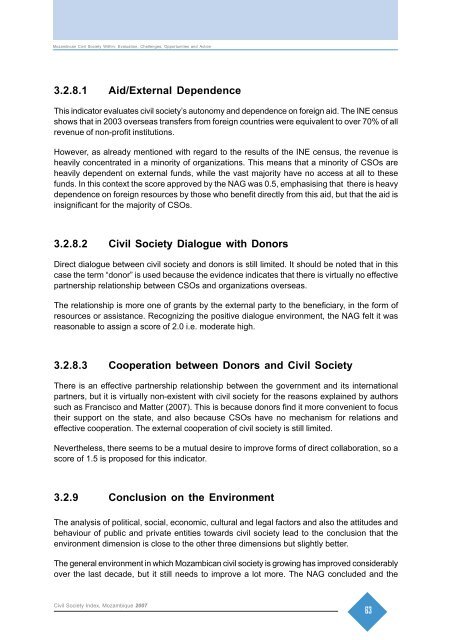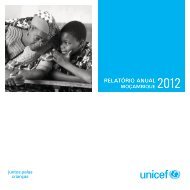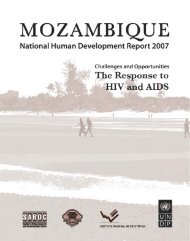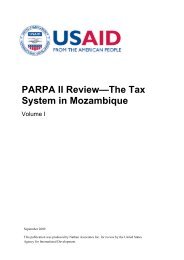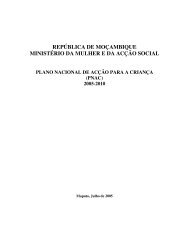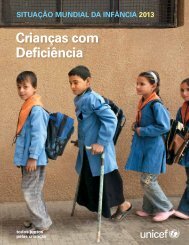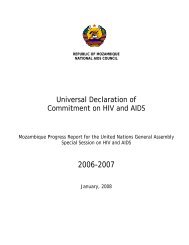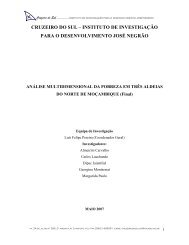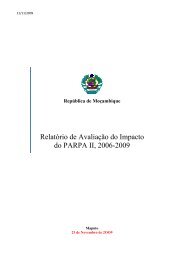Mozambican Civil Society Within: - UNICEF Mozambique - Home page
Mozambican Civil Society Within: - UNICEF Mozambique - Home page
Mozambican Civil Society Within: - UNICEF Mozambique - Home page
Create successful ePaper yourself
Turn your PDF publications into a flip-book with our unique Google optimized e-Paper software.
<strong>Mozambican</strong> <strong>Civil</strong> <strong>Society</strong> <strong>Within</strong>: Evaluation, Challenges, Opportunities and Action<br />
3.2.8.1 Aid/External Dependence<br />
This indicator evaluates civil society’s autonomy and dependence on foreign aid. The INE census<br />
shows that in 2003 overseas transfers from foreign countries were equivalent to over 70% of all<br />
revenue of non-profit institutions.<br />
However, as already mentioned with regard to the results of the INE census, the revenue is<br />
heavily concentrated in a minority of organizations. This means that a minority of CSOs are<br />
heavily dependent on external funds, while the vast majority have no access at all to these<br />
funds. In this context the score approved by the NAG was 0.5, emphasising that there is heavy<br />
dependence on foreign resources by those who benefit directly from this aid, but that the aid is<br />
insignificant for the majority of CSOs.<br />
3.2.8.2 <strong>Civil</strong> <strong>Society</strong> Dialogue with Donors<br />
Direct dialogue between civil society and donors is still limited. It should be noted that in this<br />
case the term “donor” is used because the evidence indicates that there is virtually no effective<br />
partnership relationship between CSOs and organizations overseas.<br />
The relationship is more one of grants by the external party to the beneficiary, in the form of<br />
resources or assistance. Recognizing the positive dialogue environment, the NAG felt it was<br />
reasonable to assign a score of 2.0 i.e. moderate high.<br />
3.2.8.3 Cooperation between Donors and <strong>Civil</strong> <strong>Society</strong><br />
There is an effective partnership relationship between the government and its international<br />
partners, but it is virtually non-existent with civil society for the reasons explained by authors<br />
such as Francisco and Matter (2007). This is because donors find it more convenient to focus<br />
their support on the state, and also because CSOs have no mechanism for relations and<br />
effective cooperation. The external cooperation of civil society is still limited.<br />
Nevertheless, there seems to be a mutual desire to improve forms of direct collaboration, so a<br />
score of 1.5 is proposed for this indicator.<br />
3.2.9 Conclusion on the Environment<br />
The analysis of political, social, economic, cultural and legal factors and also the attitudes and<br />
behaviour of public and private entities towards civil society lead to the conclusion that the<br />
environment dimension is close to the other three dimensions but slightly better.<br />
The general environment in which <strong>Mozambican</strong> civil society is growing has improved considerably<br />
over the last decade, but it still needs to improve a lot more. The NAG concluded and the<br />
<strong>Civil</strong> <strong>Society</strong> Index, <strong>Mozambique</strong> 2007<br />
63


